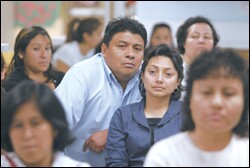Activists opposed to military recruitment in public schools are reaching out to Spanish-speaking parents to make sure they know they can tell school officials not to provide their children’s contact information to recruiters.
The activists say immigrant parents often are unaware of their rights under a provision in the federal No Child Left Behind Act that says school districts must turn over to military recruiters students’ names, addresses, and phone numbers unless their parents have signed an opt-out form at the beginning of the school year.
In addition, they say, immigrant parents often don’t know that recruiters can obtain students’ contact information and other personal data if the students take the Armed Services Vocational Aptitude Battery, an academic and occupational skills test provided free to schools by the U.S. Department of Defense.

Military recruiters want access to schools because they have students of the age that the military is seeking, said Air Force Lt. Col. Ellen Krenke, a Defense Department spokeswoman. “Seventeen to 24-year-olds—that’s the age group that the active duty force is looking for.”
“If schools are going to provide these names and telephone numbers to yearbook and ring companies, military recruiters need to have access to that also,” she said.
Hispanics made up 9.3 percent of the active-duty U.S. armed forces in December 2004, according to Col. Krenke. The U.S. Census estimated last year that 14.2 percent of people living in the United States were Hispanic.
Military recruitment in schools, which has long been controversial in some places and among some parents, has gained new attention in the past year as some branches of the military have faced difficulty meeting their personnel goals amid the ongoing campaigns in Iraq and Afghanistan. (“Recruiting in Schools, a Priority for Military, Is Targeted by Critics,” June 22, 2005.)
Last week, voters in San Francisco approved a nonbinding ballot measure that opposed, but didn’t prohibit, military recruiting in the city’s public schools. (“San Francisco Voters Go on Record Against Recruitment,” this issue.)
Capt. Carolyn Nelson, the public affairs officer for the Marine Corps Recruiting Command for the Western states, said it was important for recruiters to be able to reach students through schools.
“Individuals have busy schedules,” she said. “They do sports. They have part-time jobs. This is an avenue we have for working with these students so they get the information about the Marine Corps and have choices for their future.”
A Father’s Campaign
Fernando Suarez del Solar, a native of Mexico whose son, Jesus, died in March 2003 while he was serving with the Marines in Iraq, has become a frequent speaker at events intended to counter military recruiting among Latinos.
Lance Cpl. Jesus Suarez del Solar, 20, apparently died after he stepped on an unexploded cluster bomb remaining in a field that U.S. forces had hit with ordnance the previous evening, according to an account in TheSan Diego Union-Tribune. He had graduated from Valley High School in Escondido, Calif., in 2001.
Mr. Suarez del Solar, who lives in Escondido, said he and his son were misled by military recruiters, whom they first met, he said, at an information table in Tijuana, Mexico, when Jesus was 13 and before they moved to the United States. He said that recruiters promised his son he could join the Marines for only one year and could get a job combating drug trafficking. Instead, he said, the young man was obligated to stay in the Marines for four years and ended up in Iraq.

Capt. Nelson said she has found that “whenever the recruiters are out there, they are honest about letting [potential recruits] know about the years they are serving in the military, and what jobs are available.”
After his son died, Mr. Suarez del Solar started Proyecto Guerrero Azteca, which is Spanish for Aztec Warrior Project. The group helped sponsor a one-day campaign in August to tell Latino parents they could opt out of having districts provide their children’s contact information to recruiters.
The Project on Youth and Non-Military Opportunities, or Project YANO, in San Diego, co-sponsored that campaign. Jorge Mariscal, a Vietnam War veteran and a professor of Spanish and Chicano studies at the University of California, San Diego, coordinates Project YANO outreach to Latinos.
Mr. Mariscal said some districts now give clearer information to parents about opting out than they have in the past. But even if Spanish-speaking parents get such information from schools, they often don’t understand broader issues about how military recruitment works in the United States, he said.
“A lot of recent immigrants think when they get a letter from the school saying their child must register with the Selective Service [System], that there is obligatory military service in the United States,” he said.
‘Pro-Military’ Latinos
The nearly 4-year-old No Child Left Behind Act says public high schools must give military recruiters the same access to students as the schools provide to recruiters from colleges and private employers.
Arlene G. Inouye, a bilingual speech and language specialist for two high schools in the 727,000-student Los Angeles Unified School District, wants her district to restrict military recruitment by, for example, permitting recruiters to visit schools only certain times during the year.
Susan Cox, a spokeswoman for the Los Angeles district, said it doesn’t have a districtwide policy on military recruitment, except to require secondary schools to mail a letter to parents outlining their rights to opt out.
Latino youths are particularly open to joining the military because many are from poor families and they don’t think they have many options after high school except to work in low-paying jobs, Ms. Inouye said.
In addition, she said, “I’ve seen so many Latino students who are so pro-military because they think that’s how they show they are American.”




